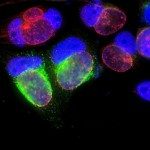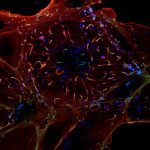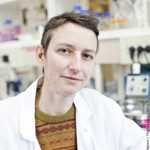Host lab
Chlamydia trachomatis is a human-adapted pathogen and develops exclusively inside a vacuolar compartment. It is the leading cause of sexually transmitted infection of bacterial origin. The Subtil lab investigates how the bacteria manipulate the host cell to establish a beneficial replication niche. Our recent studies have characterized some of the consequences of infection on host cell intracellular traffic, host metabolism, chromatin integrity and on the innate response to infection.
Project
The bacteria manipulate intracellular traffic to build their own replication niche. The successful candidate will investigate FcRn-mediated transport of immunoglobulins in polarized epithelial cells infected with Chlamydia trachomatis. The effects of immunoglobulins against specific bacterial antigens on the course of infection will be studied to identify suitable vaccine candidates. This project is led in collaboration with Sanofi Pasteur.
Environment
The applicant will benefit from a highly collaborative, dynamic and international environment at Institut Pasteur within center Paris. The Subtil lab is associated with the Cell Biology and Infection department (18 teams). The Institut Pasteur hosts 13 departments (142 teams) and counts 15 technological platforms.
Please visit our web site: https://research.pasteur.fr/en/team/cellular-biology-of-microbial-infection/
Requirements
- PhD in cell biology, with large experience in microscopy techniques and image analysis.
- An experience in models of polarized epithelial cells is a plus but is not essential.
Salary
Based on experience following Institut Pasteur grids. The project is funded for 24 months, with possible extension.
To apply
Submit a cover letter containing a statement of interests and future goals, a CV with a list of publications and names of two references from mentors to asubtil@pasteur.fr
Starting date
Applications are reviewed as they are received: candidates are encouraged to submit their application as soon as possible. The expected start date is May 2022.
Related publications from the Subtil lab
– The Chlamydia effector CT622/TaiP targets a non-autophagy related function of ATG16L1 PNAS (2020). 117(43):26784-26794 doi:10.1073/pnas.2005389117
– Infection-driven activation of transglutaminase 2 boosts glucose uptake and hexosamine biosynthesis in epithelial cells. EMBO J. (2020) 39, e102166 doi 10.15252/embj.2019102166
– The loss of expression of a single type 3 effector (CT622) strongly reduces Chlamydia trachomatis infectivity and growth Front Cell Infect Microbiol. (2018) 8:145 doi 10.3389/fcimb.2018.00145
– The DUF582 Proteins of Chlamydia trachomatis Bind to Components of the ESCRT Machinery, Which Is Dispensable for Bacterial Growth In vitro. Front Cell Infect Microbiol. (2016) Oct 7;6:123. doi: 10.3389/fcimb.2016.00123
– Sequestration of host metabolism by an intracellular pathogen. eLife. (2016) Mar 16;5:e12552. doi: 10.7554/eLife.12552.


